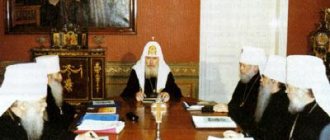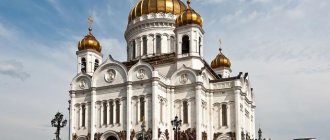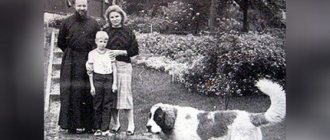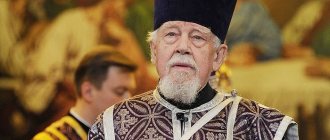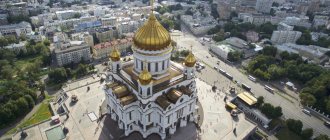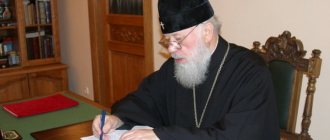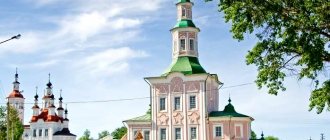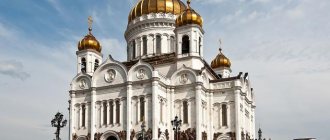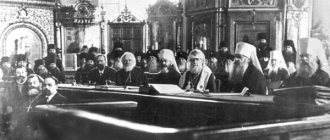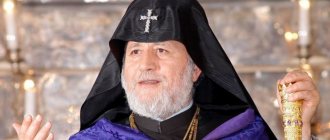What is the role of a vicar in an Orthodox parish?
Photo: Mitropolia-lip.ru
In the Orthodox tradition, the person holding this position is the chief assistant to the priest. The key feature of this position is that the vicar, by definition, does not have his own diocese.
It is noteworthy that by remaining in this position even for a certain time, he is allowed to become a priest. The only condition is support from the diocese and the bishop himself. For this reason, the position is not considered permanent; as a rule, no one holds it for a long time.
Sometimes the vicar is entrusted with the leadership of some part of the diocese. This usually happens if for some reason there is no priest, he is unable to fulfill his duties. There were even precedents in the history of the Orthodox Church when a vicar was placed in charge of the entire city. His immediate responsibilities included monitoring the conduct of services in all city churches without exception.
Often the nature of this office is emphasized when it is designated suffragan bishop or suffragan bishop, directly indicating whose specific deputy the minister is.
In some churches there is another designation for this position - chorebishop. This concept became known under Peter I, entrenched in the Orthodox tradition by the end of the 18th century.
The Holy Synod of the Russian Orthodox Church replaced the vicar of Patriarch Kirill
VALAAM, July 9. /TASS/. The Holy Synod of the Russian Orthodox Church on Tuesday replaced the first vicar of the Patriarch of Moscow and All Rus', the rector of the St. Petersburg Theological Academy, the Sretensky Theological Seminary and the head of the Synodal Department for Youth Affairs, the Moscow Patriarchate reported. The head of the patriarchal press service, priest Alexander Volkov, told reporters about this on Tuesday after a meeting of the Holy Synod.
The first vicar of the Patriarch of Moscow and All Rus', Metropolitan Arseny of Istra, will leave his post and become the head of the Lipetsk Metropolis. Earlier, the Synod, with gratitude “for the many years of archpastoral care of the Lipetsk diocese,” granted the request for the “retirement” of Metropolitan Nikon of Lipetsk and Zadonsk in connection with his reaching 75 years of age.
“For the entirety of the Russian Church, for the residents of Moscow, a special decision of the Synod was that the first vicar of the Patriarch of Moscow and All Rus' was appointed administrator of the Lipetsk Metropolis. Former Metropolitan of Istra, now Lipetsk Arseny is the most experienced bishop of our Church, whom the Moscow clergy loves very much and has known for 30 years. He invariably maintained an ardent love for church life and for the Moscow clergy, who are very grateful to him for his many years of work,” said Alexander Volkov.
Also on Tuesday, the Synod relieved Archpriest Kirill Sladkov from the post of chairman of the Synodal Department for Youth Affairs and expressed gratitude for his work. The chairman of the department was the former Bishop of Peterhof Seraphim, vicar of the St. Petersburg diocese. Previously, he served as rector of the St. Petersburg Theological Academy (SPbDA).
Hieromonk Silouan (Nikitin), who previously served as rector of Sretensky Theological Seminary, was appointed rector of St. Petersburg and Bishop of Peterhof. In turn, Archbishop Ambrose of Vereya was appointed acting rector of Sretensky Theological Seminary, who will simultaneously remain rector of the Moscow Theological Academy.
The Holy Synod is the governing body of the Russian Orthodox Church in the period between Councils of Bishops, which are convened at least once every four years. The Synod consists of a chairman - the patriarch, nine permanent and five temporary members - diocesan bishops. Periodically, the Holy Synod holds visiting meetings. This year it was held for the first time on Valaam.
Job responsibilities
Photo: Mitropolia-lip.ru
The vicar is considered a significant spiritual rank, therefore he has a lot of responsibilities, one way or another aimed at participating in the life of a particular parish. The main ones include:
- Providing comprehensive assistance to the head of the diocese in management matters.
- Monitoring the implementation of orders and decrees of the bishop.
- Official correspondence with the heads of neighboring parishes belonging to a given diocese. As a rule, these appeals are addressed to the bishop; the vicar draws up the text and coordinates it with him.
- Visits and holding services in cathedrals in the diocese. Control over their activities.
- Formation of lists of clergy and parish leaders who need to be removed from ministry or vice versa appointed.
- Nomination of candidates for ordination.
- Drawing up recommendations for applicants to educational institutions founded by the Russian Orthodox Church.
- Formation of proposals on the need to open monasteries or new parishes.
- Issuing temporary directions to clergy for performing divine services. They can obtain permission from the vicar for a maximum of one month.
- The vicar is responsible for the level of education of confessors and all ministers of the parish churches. If necessary, he organizes special seminars or sends them for additional training.
- Formation of lists of ministers of monasteries and parishes who should be included in the award.
- The vicar is responsible for drawing up and maintaining the vacation schedule for ministers. Such a schedule is sent to the diocesan administration every year.
- Reception and consideration of complaints filed against clergy. Among the functions of a vicar is resolving conflicts that arise.
- The vicar is responsible for preparing the financial reports that are required to be submitted to the diocese.
Patriarch and/or his vicar. Two lines in the Russian Church
These are Patriarch Kirill and Bishop Tikhon (Shevkunov) of Yegoryevsk, the patriarch’s vicar, about whom a whole series of publications have been published in various media over the past month. What kind of people are these, how do they see the church? What should we expect from them?
One of the most controversial figures in the Russian Church in the 20th century, who largely determined the vector of its future life, is Metropolitan and later Patriarch Sergius (Stragorodsky), who signed the famous Declaration in 1927, in which, on behalf of the Russian Church, he declared loyalty to the Soviet authorities. Anyone who now becomes the head of the church must somehow indicate his attitude towards Metropolitan Sergius and “Sergianism,” and it will be, like a litmus test, very indicative.
Both Patriarch Kirill and Bishop Tikhon are sympathetic to the activities of Patriarch Sergius (Stragorodsky), justifying the compromises that he had to make with church necessity. Last year, the Patriarch, unveiling the monument on the day of the 150th anniversary of Patriarch Sergius, said that, having become the head of the church, Sergius “had to forget about himself, so that only the Russian Church could continue its historical existence, so that it would not be expelled from the life of the people.” . Bishop Tikhon, in an interview on the Radio Liberty website, characterizes his activities as follows: “Metropolitan Sergius justified his church policy with the conviction that if the Church went underground, the Bolsheviks would inevitably plant in the country the non-canonical, false renovationist church they had already prepared.” To avoid this, Metropolitan Sergius, according to Bishop Tikhon, had to make difficult compromises and completely subordinate the church administration to Soviet power: “Metropolitan Sergius knew perfectly well that any resistance to the instructions of the authorities, as experience showed, would immediately increase repression and mass executions among bishops and priests in prison."
Metropolitan Sergius (Stragorodsky)
What kind of phenomenon is this - renovationism, out of fear of which it was justified to lie and sacrifice church freedom? Renovationism is a project of the Cheka, created to control and destroy the church. Therefore, the main evil of the Renovationists is not their non-canonical nature or the innovations that they wanted to introduce into church life, but their close cooperation with the state, the transformation of the church into an obedient instrument of power. “The Church cannot exist without the support of the state. What do you want? “This ancient slogan has become the main line of behavior of renovationist leaders since 1922.” This is what Anatoly Levitin and Vadim Shavrov write in “Essays on the History of Russian Troubles.”
And although the patriarch and his vicar speak sympathetically towards Metropolitan Sergius, the position of Bishop Tikhon is more reminiscent of the position of the Renovationists, while the position of Patriarch Kirill is closer to the position of Sergius himself. It is impossible to draw too direct analogies, but the similarities seem significant. Yes, Bishop Tikhon positions himself as a conservative person, but upon closer examination it is not difficult to see in his activities a continuation of the line of renovationist leaders, among whom there were conservatives who justified the anti-church criminal Soviet power as well as more liberal-minded members of the renovationist church.
Bishop Tikhon’s views on the spiritual life can be understood by reading his bestseller “Unholy Saints.” “This book is evidence of how superstition replaces faith, creating the illusion of spiritual life, which, unfortunately, satisfies many Christians, but obscures from them the deeper aspects of knowledge of their own faith,” we read in the review of monk Diodorus (Larionov) and Marina Ignatieva. It is characteristic that one of the main characters of “The Unholy...” Archimandrite Gabriel (Steblyuchenko) is known as an active agent of organs. Even Patriarch Pimen at one time could not remove him from his post as governor of the Pskov-Pechersk Monastery, since the Council for Religious Affairs stood up for the archimandrite.
Bishop Tikhon’s film about Byzantium and the exhibition “Russia is my history,” which historians called a “propaganda toy,” all this very clearly shows the bishop’s worldview. Tikhon, his vision of the church in this world. The main message of the exhibition is the glorification of power: tsarist, Soviet, Russian...
The abbot of the Sretensky Monastery is Tikhon Shevkunov. Photo: Georgy Kurolesin/RIA Novosti
Lately, Bishop Tikhon has been increasingly voicing a certain special charisma of the Russian people, supposedly all they know how to do is build an empire, that is, a large and powerful state in which all power should be concentrated in one hand, apparently as it was in the Russian Empire , where the emperor was the head of the church, or in the Soviet Union, where the church was completely dependent on the atheistic state. However, Bishop Tikhon does not hide his sadness from the collapse of the “Evil Empire”.
If for Bishop Tikhon, as it once was for the Renovationists, the ideal church is part of a powerful state, then for Patriarch Kirill it is important that the church be independent, existing with the state on a parity basis as a powerful social institution. He reserves for the church the right and opportunity to have its own position, although this is not possible today even on the most important issues, because the church in history has been given too many political and property “loans” that are difficult to repay. For some reason, the patriarch’s attempts to defend the independence of the church are not noticed. His words that “the church has never been so free as it is now” are perceived either as a formality or as an awkward political gesture, but not as a declaration of intent or hope. No one recognized as an act that the patriarch did not come to the celebration of the annexation of Crimea, did not speak out in favor of any side in the event of a conflict in Donbass, did not take the political pro-Russian side during the military conflict with Georgia... Something that is easily given to any avid peace lover from among his critics, often without risking anything or anyone. They see (and rightly!) how officially the patriarch makes compromises, as Metropolitan did in his time. Sergius, and says all sorts of things about villains, including Stalin, and they do not notice how, through those close to him, he broadcasts his more categorical position on these issues. An astute observer might have noticed compromises and such non-standard episodes in the activities of Patriarch Kirill, but everyone only notices compromises.
Patriarch of Moscow and All Rus' Kirill Photo: Sergey Pyatakov / RIA Novosti
To a person who has a more nuanced understanding of the church situation and is interested in normalizing church life, efforts on the part of the patriarch in terms of organizing church life are obvious. The topics of catechesis, community life, and spiritual education began to be raised more actively. There are certain improvements regarding worship. Even at the beginning of the 2000s, weekly communion and communion on holidays were considered unacceptable for the laity; now regular communion has been declared a general church norm. The norm of confession is returning, which ceases to be a “pass” to communion, which is what the official document is dedicated to. Circles for the study of the Gospel began to appear - the Bible is no longer considered a “Protestant book” not only in megacities, but also in the provinces. A well-functioning office has appeared, which, as a rule, responds to the requests of believers, and a church-wide court, standing above the diocesan court, which, as is known, is completely controlled by the ruling bishop. There are many known cases when a church-wide court restored unjustly banned clergy to ministry.
What I find difficult to agree with in the patriarch’s activities is that he is primarily trying to make the church free and strong through strengthening the vertical of power, thereby weakening independence and initiative within the church, which is clearly evidenced by the new parish charter of the Russian Orthodox Church, adopted in 2009 . As the priest noted in his LiveJournal. Pavel Adelgeim: “This Charter completed the process of absolutization of episcopal power in the Russian Orthodox Church.” Trying to make the church influential and strong, he relies more on the system rather than on people, which is confirmed by this parish charter, which, according to the priest. Pavel Adelgeim, “excluded the concept of “parishioner.” “Laity” and “parishioners” have been eliminated as a class.” It was precisely this mistake, in my opinion, that Metropolitan made in his time. Sergius, believing that, first of all, through the structure of church power and its “correct” agreement with state power, the church can be saved from complete ruin.
Alexander Nevsky Brotherhood
But despite all the shortcomings of the church system being built by Patriarch Kirill, it is preferable to the system of the bishop. Tikhon. Of course, the clerical model, which completely displaces the laity from church administration and service, is a big problem, but within its framework one can still talk about the possibility of changing the vector, while the church is still understood as an independent community where God is the “main thing.” The only question is how this primacy of God is realized, the recognition of His will and the ways of its fulfillment; in the clerical system - only through bishops. At the same time, Patriarch Kirill still speaks about the activity of the laity, and about their inclusion in church life not only as passive recipients and spectators of various miracles, although this most often remains a good wish, but at least there is something to talk about here. The system is ep. Tikhona is a dead end from the very beginning, because she generally does not think of the church “in any volume” - from the patriarch to the laity - as not controlled (directed) by the state. Moreover, independence here is considered dangerous, scary and harmful. The image of the church that the bishop constructs. Tikhon simply excludes a living and free path for the church, giving it to the service of state ideology with any political course, which is very well demonstrated by both his film about the fall of Byzantium and the exhibition we have already mentioned.
In order to make the church truly free, strong - a living, full-fledged spiritual organism, like the Body of Christ - we should pay utmost attention to the most significant event of the last century in the history of the Russian church - the council of 1917-1918. Unfortunately, so far the actions of this council, which is sometimes called the “Great Moscow”, have not yet been comprehended and accepted by the Russian Church. The council was not and could not be ideal, but its discussion of the organization of parish life, church structure, issues of the election of the episcopate and clergy, and services in the Russian and Little Russian languages deserve special attention as a restoration of the ancient church norm. In 1918, Patriarch Tikhon (Belavin) of Moscow issued an appeal to “arrange spiritual unions,” which was followed by self-organization of believers and the gathering of church brotherhoods and communities. Soviet newspapers in Petrograd in the 1920s spoke of an “epidemic of brotherhoods.” The most famous of them are the Alexander Nevsky Brotherhood in Petrograd and the Moscow communities of Sschmch. Sergius Mechev, Kyiv - Fr. Anatoly Zhurakovsky, but there were others who became a genuine alternative to renovationism. The experience of their lives tells us that the church can exist not only without the support of the state, but even in spite of the most severe persecution, relying more on Christian friendship, on believers.
Why are all those true words about catechesis, about the activity of the laity and their involvement in ministry, about the rapprochement of priests and people, which are spoken by the patriarch, so little effective? Perhaps because all this is said in the systemic thinking paradigm established in the Russian Orthodox Church, as if real catechesis, education, and community life can be revived through circulars from above. We need to rely on specific people, on those who want something and actually do something in the church. And there are such people, even if there are not very many of them, but they still exist. What can be done here? How can these people be discovered and called upon? Maybe we need a new call from the patriarch to gather in informal circles and unions, to hold seminars, meetings, forums, where to invite representatives of various cultural and educational movements, initiative parishes, brotherhoods, and sisterhoods. Such a gathering of all caring people of the church could be a worthy conclusion or continuation of the council of 1917–1918, where we can together try to reflect on the revival of the church in modern conditions, how we can implement what was already adopted at the “Great Council”. Only in such a conciliar discussion can something real emerge: the living church activity of believers who want to work for the revival of the church and Russia.
In the meantime, in the media space, the patriarch is almost losing out to the bishop. Tikhon, whose exhibition, publishing and other activities are promoted by state and church media. It is difficult to remember church, state, or even more so private mass media that would speak positively, balancedly, and in a non-boring manner about the patriarchal activities. Sometimes one gets the feeling that even in the church environment, the rule of good form is to attack the patriarch, which contributes to the predominance of the bishop’s line. Tikhon, which carries the threat of the return of renovationism as the dark twin of the church.
Anglicanism
In this Protestant church the vicar is actually the parish priest. Historically, Anglicanism has recognized the administrative division between permanent curators and rectors. The latter received tithes as financial support. Curators are something like a salary. A vicar was a type of rector who had a smaller tithe. Now both of these titles are almost equal. Some Anglican parishes have a rector and some have a vicar. It all depends on how it developed historically in a given area. In the Episcopal Church of the United States, the position of vicar is not defined by canon law. But in some dioceses this is a priest invested with a specific mission.
Dionysius, Bishop of Resurrection, Vicar of His Holiness the Patriarch of Moscow and All Rus'
Date of birth: October 1, 1975
Date of consecration: November 27, 2011
Date of tonsure: August 28, 2000
Angel Day: October 16
Biography:
Born on October 1, 1975 in Ryazan into a family of employees.
In 1992, he graduated from secondary school-gymnasium No. 5 in Ryazan and entered the Faculty of History and English at the Ryazan State Pedagogical University. S.A. Yesenina. While studying in the 5th year, he simultaneously worked as a history teacher in grades 5-7 at secondary school No. 17 in Ryazan. In 1997 he graduated from the Russian State Pedagogical University with a degree in history and English teacher. In 1997-1998 worked as a leading specialist in the department for organizing personalized accounting in the branch of the Pension Fund of the Russian Federation in the Ryazan region.
On September 1, 1998, he entered the St. John the Theological Monastery of the Ryazan Diocese, where on November 1 of the same year, with the blessing of Archbishop Simon of Ryazan and Kasimov, Bishop Joseph of Shatsky, vicar of the Ryazan Diocese, made him a subdeacon. Since January 1999 - senior subdeacon and cell attendant of Bishop Joseph of Shatsk.
In 1998-2001 studied at the correspondence department of the Ryazan Theological School.
On March 27, 1999, Bishop Joseph of Shatsky ordained him a deacon at the St. John the Theologian Monastery and appointed a monk of the monastery. On March 23, 2000, he was enrolled in the brethren of the St. John the Theologian Monastery.
On August 28, 2000, the abbot of the St. John the Theologian Monastery, Archimandrite Abel (Makedonov), tonsured him into a mantle with the name Dionysius in honor of the Hieromartyr Dionysius the Areopagite, Bishop of Athens.
In 2002-2009 studied at the correspondence department of the Moscow Theological Academy.
Since April 2004 - personal secretary of the rector of the St. John the Theological Monastery, Bishop Joseph of Shatsk. Since March 2005 - acting Dean of the St. John the Theologian Monastery, since January 2006 - Dean.
In 1996-2004 - presenter of a column in the television program “Grains” (State TV and Radio Broadcasting Company “Oka”), in 2000-2005. - Member of the editorial board of the Blagovest newspaper.
On November 4, 2006, Archbishop Pavel of Ryazan and Kasimov ordained him a hieromonk.
In 2007 - head of the Church Historical Expedition at the Ryazan Diocese.
October 5, 2007 appointed acting Abbot of the St. John the Theologian Monastery. By the decision of the Holy Synod of December 27, 2007, he was appointed abbot of the St. John the Theologian Monastery.
On May 21, 2009, Archbishop Pavel of Ryazan elevated him to the rank of abbot.
From January 25 to May 25, 2010, he underwent professional retraining at the Moscow Academy of State and Municipal Administration under the program “State and Municipal Administration.”
On March 2, 2011, he was appointed rector of the St. John the Theologian Monastery.
On May 17, 2011, he was appointed chairman of the trustee commission of the Ryazan diocese. On May 24, 2011, he was appointed secretary of the ecclesiastical court of the Ryazan diocese.
Since 2004 - senior lecturer in the department of theology, faculty of Russian philology and national culture, Ryazan State University. S.A. Yesenina. Since 2006, he taught a course on the history of the Ancient Church at the Ryazan Theological Seminary.
By the decision of the Holy Synod of October 5-6, 2011 (magazine No. 135), he was elected Bishop of Kasimov and Sasov.
On October 9, 2011 he was elevated to the rank of archimandrite.
He was consecrated bishop on November 25, 2011 at the working Patriarchal residence in Chisty Lane in Moscow. He was consecrated on November 27 during the Divine Liturgy at the Conception Stavropegic Monastery in Moscow. The services were led by His Holiness Patriarch Kirill of Moscow and All Rus'.
By the decision of the Holy Synod of December 27-28, 2011 (magazine No. 168), he was relieved of his post as abbot (abbot) of the St. John the Theological Monastery in the village. Poshupovo, Ryazan region.
At the Council of Bishops in 2022, he was elected a member of the Supreme Church Court with an appointment to the position of court secretary.
By the decision of the Holy Synod of July 14, 2022 (journal No. 51), he was appointed vicar of the Ekaterinodar diocese with the title “Tuapse”.
By the decision of the Holy Synod of December 28, 2022 (journal No. 113), he was appointed vicar of His Holiness the Patriarch of Moscow and All Rus' with the title “Resurrection”.
By order of His Holiness Patriarch Kirill dated January 24, 2022, he was appointed manager of the South-Eastern Vicariate of Moscow.
At a meeting of the Holy Synod on February 26, 2022, he was appointed first deputy manager of the affairs of the Moscow Patriarchate (magazine No. 4) and abbot of the Novospassky stauropegic monastery (magazine No. 9).
Education:
1997 - Ryazan State University named after S.A. Yesenina.
2001 - Ryazan Theological School (in absentia).
2009 - Moscow Theological Academy (in absentia).
2010 - Moscow Academy of State and Municipal Administration.
His Eminence THOMAS, Bishop of Sergiev Posad and Dmitrov
Thomas, Bishop of Sergiev Posad and Dmitrov, Vicar of His Holiness the Patriarch of Moscow and All Russia (in the world Demchuk Vadim Borisovich) was born on March 9, 1983 in Balti, Republic of Moldova in a family of workers. Baptized in infancy.
From the age of 10 he served as an altar boy in the Assumption Church. Moara de Piatra in the Drochievo region of Moldova, then in the St. Nicholas Cathedral in Balti.
In 1990-2000 studied at secondary school No. 4 in Balti. After graduating from school, he moved to the Holy Trinity Lavra of St. Sergius, where he worked as a laborer and prepared to enter the seminary, studying at catechetical courses at the Peter and Paul Lavra's courtyard.
On August 13, 2002, he was enrolled in the first year of the Moscow Theological Seminary and was appointed to serve as subdeacon of the rector of the MDA, Archbishop Eugene of Vereisky.
On February 27, 2007 he was accepted into the brethren of the Holy Trinity Sergius Lavra.
From March 2007 to July 2008, he served as sacristan and cell attendant of the Lavra confessor, Abbot Vissarion (Ostapenko, +2015). On July 21, 2008, he was appointed secretary-referent of the Viceroy of the Lavra, Bishop Feognost of Sergiev Posad.
In 2007, he graduated from the seminary, defending his thesis on the topic “The situation of the Orthodox Church in Moldova from 1924 to 1941.”
In 2008 he entered the Moscow Theological Academy, from which he graduated in 2010.
On April 22, 2008, in the Trinity Cathedral of the Lavra, Bishop Feognost of Sergiev Posad was tonsured into the ryassophore, leaving the name Vadim.
On January 22, 2009, in the Assumption Cathedral of the Lavra, Bishop Theognost of Sergiev Posad was ordained a hierodeacon, and on April 10, 2009, in the Trinity Cathedral of the Lavra, he was tonsured into the mantle with the name Thomas in honor of St. Thomas, Apostle from the 12th.
On February 27, 2011, in the Trinity Cathedral of the Lavra, Archbishop Feognost of Sergiev Posad ordained him a hieromonk.
On October 19, 2012, he was sent to the Donskoy Stavropegic Monastery in Moscow and was appointed acting housekeeper of the monastery. On April 8, 2013, he was accepted into the brethren of the monastery with confirmation in the position of housekeeper.
On January 22, 2015, he was appointed senior priest of the Church of the Sovereign Icon of the Mother of God attached to the Donskoy Monastery under the Main Directorate of the Ministry of Internal Affairs of the Russian Federation for Economic Security and Anti-Corruption in Moscow.
On December 17, 2015, he was appointed assistant to the governor of the Donskoy Monastery for liturgical and administrative matters.
By the decision of the Holy Synod of May 4, 2022 (journal No. 34), he was elected Bishop of Gdov, vicar of the Pskov diocese.
On May 10, 2022, in the Church of All Saints, in the Russian Land of the Shining Ones, the Patriarchal Residence in the Danilov Monastery in Moscow, Metropolitan Barsanuphius of St. Petersburg and Ladoga, managing the affairs of the Moscow Patriarchate, was elevated to the rank of archimandrite.
He was consecrated bishop on June 3, 2022 in the Throne Hall of the Patriarchal Chambers of the Trinity-Sergius Lavra. Consecrated on July 2 at the Divine Liturgy in the Church of St. Euphrosyne of Moscow in Kotlovka, Moscow. The services were led by His Holiness Patriarch Kirill of Moscow and All Rus'.
By the decision of the Holy Synod of July 14, 2022 (journal No. 52), he was appointed Bishop of Urzhum and Omutninsky.
By the decision of the Holy Synod of February 26, 2022 (journal No. 9), he was appointed abbot of the Donskoy Monastery in Moscow with the title “Bronnitsky”, with release from the management of the Urzhum diocese.
By order of His Holiness Patriarch Kirill dated February 28, 2022, he was appointed manager of the Northern and Northwestern Vicariates of Moscow.
By order of His Holiness Patriarch Kirill of March 12, 2022, he was released from the management of the Northern Vicariate of Moscow.
By order of His Holiness Patriarch Kirill dated July 16, 2022, he was appointed manager of the Southern Vicariate of Moscow.
In July 2022, he was appointed chairman of the Commission under the Patriarch of Moscow and All Rus' on the bringing of relics.
By decree of His Holiness Patriarch Kirill of July 23, 2022, an acting First Deputy Chairman of the Financial and Economic Administration of the Moscow Patriarchate. By order of His Holiness dated July 24, he was appointed to the position of curator of the Program for the Construction of Orthodox Churches in Moscow.
By the decision of the Holy Synod of August 30, 2022 (journal No. 116), he was appointed to the position of first deputy chairman of the Financial and Economic Administration of the Moscow Patriarchate.
By the decision of the Holy Synod of August 25, 2022 (magazine No. 51), he was appointed vicar of the Holy Trinity Sergius Lavra with the title “Sergiev Posad”, with the release from the post of vicar of the Donskoy Monastery and first deputy chairman of the Financial and Economic Administration of the Moscow Patriarchate. Also, by decision of the Synod, he was appointed chairman of the newly formed Commission of the Russian Orthodox Church for the development of Orthodox pilgrimage (magazine No. 70).
By order of His Holiness Patriarch Kirill dated September 3, 2022, he was released from the management of the North-Western Vicariate, while maintaining the management of the Southern Vicariate of Moscow.
By the decision of the Holy Synod of April 13, 2022 (magazine No. 4), he was appointed administrator of the Sergiev Posad diocese with the title “Sergiev Posad and Dmitrovsky”, while retaining the position of Vicar of the Holy Trinity Sergius Lavra.
Date of ordination: July 2, 2022 Date of tonsure: April 10, 2009 Angel Day: Antipascha
Education: 2007 - Moscow Theological Seminary. 2010 - Moscow Theological Academy.
Reverend Paramon
Paramon, Bishop of Naro-Fominsk, Vicar of His Holiness the Patriarch of Moscow and All Russia (Golubka Fedor Mikhailovich) was born on June 26, 1977 in the village. Coal of the Tyachesky district of the Transcarpathian region. Ukraine in a family of employees. In 1984-1994. studied at Uglyansk secondary school.
In 1994 he entered the Moscow Theological Seminary. On December 5, 1996, he was ordained a reader by the rector of Moscow theological schools, Bishop Eugene of Vereisky. In 1997 he was accepted into the brethren of the Trinity-Sergius Lavra as a novice.
In 1997-2001 studied at the Moscow Theological Academy.
On March 30, 1998, the abbot of the Trinity-Sergius Lavra, Archimandrite Theognost (Guzikov), was tonsured a monk with the name Paramon in honor of the holy martyr Paramon of Bithynia.
On July 23, 1998, in the Church of the Deposition of the Robe in Moscow, Bishop Alexy of Orekhovo-Zuevsky ordained him a hierodeacon.
On October 14, 2000, in the Intercession Church of the Khotkov Stavropegic Monastery, His Holiness Patriarch Alexy II ordained him a hieromonk.
In December 2001, he was sent on a business trip to the Yuzhno-Sakhalin diocese, where from December 31, 2001 to June 1, 2010, he served as the abbot of the Resurrection Cathedral in Yuzhno-Sakhalinsk.
In 2003, on the occasion of the tenth anniversary of the Yuzhno-Sakhalin diocese, Bishop Daniil of Yuzhno-Sakhalin and Kuril was elevated to the rank of abbot.
From June 1, 2010 to April 12, 2012, he served in obedience at the Trinity-Sergius Lavra.
By the decision of the Holy Synod of March 22, 2011 (magazine No. 31) he was included in the working group under the Patriarch of Moscow and All Rus' on the issues of transferring shrines (since May 30, 2011 - Commission under the Patriarch of Moscow and All Rus' on issues of transferring shrines).
By decree of His Holiness Patriarch Kirill of Moscow and All Rus' dated April 12, 2011, he was appointed full-time cleric of the Church of the Nativity of the Blessed Virgin Mary in Kapotnya, Moscow.
Since November 2011 - Chairman of the newly formed Commission for Coordination of Exhibition Activities of the Russian Orthodox Church.
By decree of His Holiness Patriarch Kirill dated February 24, 2012, he was appointed full-time priest of the Church of the Holy Apostles Peter and Paul in Lefortovo, Moscow.
By the decision of the Holy Synod of July 26, 2012 (journal No. 78), he was appointed vicar of the Donskoy Stauropegic Monastery.
On September 1, 2012, His Holiness Patriarch Kirill elevated him to the rank of abbot of the Donskoy Monastery.
By the decision of the Holy Synod of October 22, 2015 (magazine No. 63), he was elected vicar of the Moscow diocese with the title “Bronnitsky” .
October 27, 2015 in the Church of St. blgv. book Alexander Nevsky Donskoy Monastery in Moscow by Metropolitan Barsanuphius of St. Petersburg and Ladoga was elevated to the rank of archimandrite.
He was consecrated bishop on November 5, 2015 in the cross church of the Vladimir Icon of the Mother of God at the Patriarchal residence in Chisty Lane in Moscow. Consecrated on December 2 at the Divine Liturgy in the Cathedral of Christ the Savior in Moscow. The services were led by His Holiness Patriarch Kirill of Moscow and All Rus'.
By order of His Holiness Patriarch Kirill in November 2015, he was appointed manager of the Northern and Northwestern Vicariates of Moscow .
By decree of His Holiness Patriarch Kirill of April 10, 2017, in addition to the obediences carried out, an acting rector of the Patriarchal Metochion of the Church of St. Vmch. Demetrius of Solunsky in Khoroshevo, Moscow.
By the decision of the Holy Synod of February 26, 2019 (magazine No. 9), he was appointed vicar of the Holy Trinity Sergius Lavra with the title “Sergiev Posad” , with the release of the vicar of the Donskoy Monastery in Moscow.
By order of His Holiness Patriarch Kirill of February 28, 2022, he was released from the management of the Northern and Northwestern Vicariates of Moscow.
By the decision of the Holy Synod of the Russian Orthodox Church of August 25, 2022, His Eminence Paramon, Bishop of Sergiev Posad, administrator of the Northern Vicariate of the city of Moscow, was relieved from the post of vicar of the Holy Trinity Sergius Lavra and appointed chairman of the Financial and Economic Administration of the Moscow Patriarchate , retaining his duties as vicar Patriarch of Moscow and All Russia with the title "Naro-Fominsk" .
By order of His Holiness Patriarch Kirill dated September 3, 2022, he was appointed manager of the North-Western Moscow Vicariate , while maintaining management of the Northern Vicariate of Moscow. Also, by the Patriarchal decree of September 3, in addition to the obediences carried out, he was appointed rector of the Church of the Life-Giving Trinity in Khoroshevo, Moscow.
By the decision of the Holy Synod of April 13, 2022, he was relieved of the post of chairman of the Financial and Economic Administration of the Moscow Patriarchate with an expression of gratitude.
By order of His Holiness Patriarch Kirill, he was relieved of his post as rector of the Church of the Life-Giving Trinity in Khoroshevo, Moscow, and appointed rector of the Church of Saints Equal-to-the-Apostles Constantine and Helen in Mitino, Moscow.
Vicar
Born on October 6, 1960 in the village. Selivanov, Selivanovsky district, Vladimir region. in a working-class family. Baptized in infancy.
In 1978 he graduated from high school in the village. Krasnaya Gorbatka, Selivanovsky district. In 1979-1981 served in the Armed Forces.
In 1981-1982 carried out obedience in the Church of the Savior of the Image Not Made by Hands in the village. Spas-Zhelezino, Selivanovsky district, in 1982-1983. - in the Church of St. Nicholas in the city of Kirzhach, Vladimir region.
On November 22, 1983, Archbishop Serapion of Vladimir and Suzdal tonsured him as a monk in the house church of the bishop's chambers with the name Theognost in honor of Metropolitan Theognost of Kyiv and Moscow.
On January 14, 1984, in the Assumption Cathedral in the city of Vladimir, Archbishop Serapion of Vladimir ordained him a hierodeacon, and on January 19, a hieromonk.
Since April 1984 - resident of the Holy Trinity Sergius Lavra.
In 1985 he entered the Moscow Theological Seminary, in 1987, after completing his studies at the seminary, he entered the Moscow Theological Academy, from which he graduated in 1991, having defended his dissertation for the degree of candidate of theology on the topic “Pastoration according to the teachings of the Orthodox Church.”
In 1986 he was elevated to the rank of abbot, and in the same year to the rank of archimandrite.
By decree of His Holiness Patriarch Pimen of November 30, 1988, he was appointed vicar of the Holy Trinity Sergius Lavra.
Since 1990 - teacher at Moscow theological schools.
By the decision of the Holy Synod of March 12-13, 2002, he was elected Bishop of Sergiev Posad.
On March 31, 2002, during the Divine Liturgy of the Cathedral of Christ the Savior in Moscow, he was consecrated Bishop of Sergiev Posad. The consecration was performed by: His Holiness Patriarch Alexy; Metropolitans of Krutitsy and Kolomna Yuvenaly, Smolensk and Kaliningrad Kirill, Solnechnogorsk Sergius, Volokolamsk and Yuryev Pitirim; Archbishops of Istra Arseny, Vladimir and Suzdal Evlogiy, Vereisky Evgeniy; Bishops of Tula and Belevsky Kirill and Dmitrovsky Alexander.
On April 20, 2009 he was elevated to the rank of archbishop.
By the decision of the Holy Synod of March 5, 2010 (journal No. 5), he was appointed chairman of the Synodal Commission for Monasteries (in March 2012, the commission was transformed into the Synodal Department for Monasteries and Monasticism).
Since March 22, 2011 - member of the Supreme Church Council of the Russian Orthodox Church.
By the decision of the Holy Synod of February 26, 2022 (journal No. 9), he was relieved of the post of vicar of the Holy Trinity Sergius Lavra, while retaining his duties as vicar of the Patriarch of Moscow and All Rus' with the title “Kashirsky” and chairman of the Synodal Department for Monasteries and Monasticism. The Synod determined the location of Archbishop Theognostus and the indicated department to be the metochion of the Trinity-Sergius Lavra in Moscow.
December 8, 2022 by decision of the Holy Synod of Theognostus
appointed abbot of the Donskoy Stavropegial Monastery in Moscow.
On May 16, 2022, for his diligent service to the Church, Patriarch Kirill of Moscow and All Rus' elevated Archbishop Theognostus to the rank of metropolitan during a service in the Cathedral of Christ the Savior.
The article does not claim that Patriarch Kirill will soon be replaced by someone. A hypothetical situation is simply being considered in which the patriarch will have to leave his place ahead of schedule for one reason or another. Who would then become the new patriarch if this happened in the near future?
This is a question in contrast to the situation when they thought about the successor of Alexy II. There was no doubt then. Back in the mid-2000s, Russian Orthodox Church researcher Nikolai Mitrokhin predicted:
“The most obvious contender for the place of Patriarch and the second person in the church in 1993-1996. Metropolitan of Smolensk, head of the DECR, Kirill (Gundyaev), was considered. Although he headed a small and not the most important diocese, his position as head of the largest Synodal Department outweighed many other trump cards. In the first half of the 1990s. The DECR actually took upon itself all the levers of governing the Church in a new and difficult situation for it. Even new Synodal departments were not created out of the blue, but spun off from the DECR. Moreover, in their independent form they were doomed to a miserable existence. Thanks to his undoubted oratorical abilities and active contacts with the authorities and the media, Metropolitan Kirill became the most recognizable clergyman of the Russian Orthodox Church in the country after the Patriarch.”[1]
Few doubted that Kirill would become patriarch. There were no real candidates for this post. During the years of the patriarchate of Alexy II, it was clear that Kirill was the second person in the church.
Kirill established a system in which only strict subordination is possible. He says openly that those persons who refuse to obey him must leave the church, that is, it is time for them to retire.
Here are Kirill's words:
“If anyone still has doubts [about] whether it is necessary to do everything that the patriarch teaches, leave all doubts! And strictly do what I command! Because I speak not from my own wisdom, but from the wisdom of the entire episcopate of the Russian Orthodox Church. If you don’t agree, retire!”[2].
As you can understand, in such conditions his successor must be 100% loyal to Kirill and loyal to the authorities. This can be said about almost every person of the patriarch.
However, it must be emphasized that the patriarch will most likely become, firstly, a member of the synod, a metropolitan; secondly, the head of a strong synodal department. So, let's look at those who are now members of the Synod of the Russian Orthodox Church.
So:
Onufriy (Berezovsky), Metropolitan of Kiev and All Ukraine (since 2014)
Yuvenaly (Poyarkov), Metropolitan of Krutitsky and Kolomna (since 1972)
Vladimir (Kantaryan), Metropolitan of Chisinau and All Moldavia (since 2000)
Alexander (Mogilev), Metropolitan of Astana and Kazakhstan, head of the Metropolitan District in the Republic of Kazakhstan (since 2011)
Vincent (Morar), Metropolitan of Tashkent and Uzbekistan, head of the Central Asian Metropolitan District (since 2011)
Barsanuphius (Sudakov), Metropolitan of St. Petersburg and Ladoga, administrator of the Moscow Patriarchate and secretary of the synod (since 2009)
Pavel (Ponomarev), Metropolitan of Minsk and Zaslavsky, Patriarchal Exarch of All Belarus (since 2014)
Hilarion (Alfeev), Metropolitan of Volokolamsk, Vicar of His Holiness the Patriarch of Moscow and All Rus', Chairman of the Department for External Church Relations (since 2009)
Filaret (Vakhromeev), Honorary Patriarchal Exarch of All Belarus (since 1981)[4].
If for some reason Kirill ceased to be a patriarch even today, then a patriarch would be chosen from among these people. But who has the best chance? Probably, the metropolitans of the independent republics have no chance at all. They do not have much influence on Russian territory. And they enjoy formal honor. There is either no real authority, or almost no authority.
Therefore, we will immediately exclude them, leaving only those who influence the situation in Russia:
Yuvenaly (Poyarkov), Metropolitan of Krutitsky and Kolomna (since 1972)
Barsanuphius (Sudakov), Metropolitan of St. Petersburg and Ladoga, administrator of the Moscow Patriarchate and secretary of the synod (since 2009)
Hilarion (Alfeev), Metropolitan of Volokolamsk, Vicar of His Holiness the Patriarch of Moscow and All Rus', Chairman of the Department for External Church Relations (since 2009)
The choice is small. But who can be considered the most patriarchal person? And now this is the main criterion. There is no doubt that this is Metropolitan Hilarion. True, of course, he is young for such a position. But it is still unknown how long Kirill will last. So, apparently, Hilarion is being groomed as a successor.
There are also rumors on the Internet that Tikhon (Shevkunov) is being prepared to succeed the patriarch. First of all, the reason for this is loyalty to the authorities. But in fact, all candidates can be considered loyal. Shevkunov is advancing in his church career, and it is possible that soon there will be all the conditions to apply for the post of patriarch. However, it can hardly be considered that he is as close to the patriarch as Hilarion.
After all, the latter now heads the DECR, and this means a lot in modern conditions. It is also necessary to say that there are three main groups within the Russian Orthodox Church, as Mitrokhin wrote:
“There are now three ideological trends among the clergy of the Russian State Historical Center. These are modernists (liberals), traditionalists (conservatives) and fundamentalists.
The most common are fundamentalists who, in the sphere of church life, demand a return to the earliest possible times of Russian Orthodoxy. The ideal for them is the 15th-16th centuries, when the closed Russian society was saved from the “bad influence” of Western (Catholic) civilization and was, as it seems to them, united in its views. They are supporters of the strictest, monastic performance of rituals and observance of fasts, marriage obligations, and emphasized male dominance in the family. Apocalyptic (eschatological) sentiments are very widespread among fundamentalists, which greatly influences their position not only on doctrinal, but also on social issues. They have a sharply negative attitude towards any contacts with heterodox faiths, and politically they adhere to monarchical, sharply anti-liberal and anti-Semitic views. Their slogan: “Democracy is in hell, but in heaven there is a kingdom”[1].
This provision is still relevant today. According to this classification, Kirill and Hilarion are conservatives, while Tikhon is a fundamentalist. But there are no modernists among the possible patriarchs.
Why can Hilarion be singled out? Because he almost always speaks out on the same topics as the patriarch, and he also constantly seizes power. His point of view on almost every issue does not differ from the position of the patriarch. Here is his statement about the current government:
“Stability does not mean stagnation, when all social and legal development of the state ceases, thought and creativity weaken. Stability is the systematic development of a country, when the state successfully solves current internal and external problems, strives to provide a decent life for its citizens, and people have the opportunity to have a comfortable existence and personal comprehensive development. Our Church, like all healthy social forces, has always welcomed and supported the course of the country's leadership aimed at creating a strong state, a sustainable, fair society in which human life is valued, all the necessary conditions are created for the creative and intellectual development of a person, families are supported, including including large families, people with disabilities, pensioners and other vulnerable categories of the population”[3].
Hilarion cooperates with the authorities and partly even plays the role of a diplomat for them. What Kirill actually did before he became patriarch. Although from time to time he also visits various countries, and on the presidential plane[4].
Based on this, there is no doubt that the patriarch personally considers Hilarion to be his successor. It is also likely that the authorities consider Hilarion to be the patriarch’s successor.
By the way, if you look at the analytics in the media on this issue, Tikhon and Hilarion are considered the main contenders[5].
Time is of the utmost importance to candidates in this topic. That is, if they apply for the place of patriarch in the coming days, then Hilarion will probably win, but if a lot of time passes and Tikhon manages to move further up the career ladder, then he has a great chance of becoming patriarch.
Sources
Sources
- Mitrokhin N. Russian Orthodox Church: current state and current problems, 2004.
- Patriarch Kirill threatened pensions to priests who disagree with him. URL: https://lenta.ru/news/2017/09/21/kyrill_retired/
- Interview of Metropolitan Hilarion of Volokolamsk to the Japanese news agency Kyodo Tsushin. URL: https://mospat.ru/ru/2018/03/12/news157789/
- Patriarch Kirill flew on the presidential plane with Putin's permission. URL: https://www.km.ru/v-rossii/2013/06/06/vladimir-putin/712528-patriarkh-kirill-letal-na-prezidentskom-samolete-s-razresh
- Who will replace the patriarch: Hilarion and Tikhon are losing authority. URL: https://argumenti.ru/politics/2018/02/564168?typelink=openlink
Types of vicars in Catholicism
In this church, canon law provides for many types of such substitutes. For example, an apostolic vicar is a bishop or priest who heads a special mission of the church and represents the Pope in territories where there are no dioceses. This is what legates were often called. There were also deputy bishops who had legislative and executive power in the lands entrusted to them. These are vicars general and judicial vicars. However, they did not have the right to inherit the department. Bishops were also called vicars. They were delegated certain powers of bishops within the diocese. And the lowest type of vicar is the assistant to the parish priest.
Orthodoxy
This title is also used in the Eastern churches. In Orthodoxy, a vicar is an auxiliary bishop. It does not have its own diocese. Orthodox vicars can also bear different titles. For example, if such a bishop helps to govern a certain part of a diocese, then it is called a vicariate, and his powers extend only to this limited territory.
There may also be a city under the control of the vicar, where services are carried out under his leadership. Typically large dioceses have one or more deputy bishops to whom some authority is delegated. However, unlike Catholicism, such a vicar does not have independent jurisdiction. In some Orthodox churches, such stewards are called chorebishops. In Russia, this term appeared under Peter the Great and was finally strengthened under Catherine the Great.
Russian Orthodox Church
Born on November 21, 1980 in the village. Oktyabrsky, Skopinsky district, Ryazan region. From the age of 11 he began to serve at the altar, as well as sing and read in the choir
In 1998, after graduating from school, he entered the Ryazan Orthodox Theological School, from which he graduated in 2002.
In 2002-2005 studied at the Moscow Theological Seminary, after which he entered the Moscow Theological Academy.
In November 2006 he was sent to study in France. He studied at the Master's program at the Practical School of Higher Studies (Ecole Pratique des Hautes Etudes) in Paris. In 2009, having received a master's degree, he returned to the Moscow Theological Academy, where he combined external studies with teaching. He taught Latin and French from 2009 to 2016.
On March 16, 2010, in the Trinity Cathedral of the Trinity-Sergius Lavra, he was tonsured into monasticism with the name Theodoret in honor of the Hieromartyr Theodoret, presbyter of Antioch.
On April 1, 2010, he was ordained to the rank of hierodeacon, and on February 15, 2012, to the rank of hieromonk. The tonsure and ordination were performed by the rector of the Moscow Theological Academy, chairman of the Educational Committee of the Russian Orthodox Church, Archbishop Eugene of Vereisky.
In 2010 he graduated from the Moscow Theological Academy, defending his Ph.D. thesis. In 2012-16 Studied at the Moscow Orthodox Institute of St. John the Theologian (faculty of religious studies).
He served in the following obediences at the Moscow Theological Academy and the Educational Committee: teacher of the MDA (2009-2016); Secretary of the Rector of the MDA (2010-16); Assistant to the Chairman of the Academic Committee (2011-16).
Combined responsibilities with these positions:
- executive secretary of the church-wide Commission for the distribution of graduates of central educational institutions of the Russian Orthodox Church (2015-16);
- responsible for office work and correspondence with the Moscow Patriarchate, Synodal structures of the Russian Orthodox Church and the Supreme Church Council (2010-16);
- member of inspection commissions of theological seminaries;
- coordinator in matters of ordination through the Educational Committee of students of theological educational institutions located in the Patriarchal region.
In addition to serving in the Intercession Academic Church, he held pastoral practice at the Pyatnitsky metochion of the Trinity-Sergius Lavra (2013-16), as well as in the church of military unit No. 16685 of St. blgv. Prince Alexander Nevsky (2014-16).
In April 2016, he submitted a request to be sent to the Skopino diocese of the Ryazan Metropolis.
In April 2016, he was appointed rector of the Church of the Assumption of the Mother of God in the city of Ryazhsk, Ryazan region. In August of the same year, he was appointed rector of the Holy Spiritual Bishop's Metochion in the city of Skopin and head of the monastic brotherhood at the metochion.
In March 2022, after the transformation of the Holy Spiritual Metochion in Skopin into the Holy Spiritual Monastery, he was appointed rector of the said monastery, leaving his previous obediences.
In the Skopinsk diocese he carried out obediences: dean of the monasteries of the Skopinsk diocese; Secretary of the Diocesan Council; Chairman of the Commission on Perpetuating the Memory of the New Martyrs and Confessors of the Russian Church; secretary of the diocesan court; Secretary of the Interdiocesan Liturgical Commission of the Ryazan Metropolis; secretary of the protege commission; head of the department of church-practical disciplines at the Ryazan Theological Seminary; teacher at the Ryazan Theological Seminary.
By the decision of the Holy Synod of July 29, 2022 (journal No. 52), he was elected Bishop Skopinsky and Shatsky.
On August 8, 2022, in the Church of All Saints, in the Russian Land of the Shining Ones, the Patriarchal residence in the Danilov Monastery in Moscow, Metropolitan Barsanuphius of St. Petersburg and Ladoga, managing the affairs of the Moscow Patriarchate, was elevated to the rank of archimandrite.
He was ordained bishop on August 18, 2022 in the Church of the Praise of the Most Holy Theotokos of the Constantine-Eleninsky Convent of the St. Petersburg Diocese. Herotonisan on August 19 during the Liturgy on Cathedral Square in Vyborg, Leningrad Region. The services were led by His Holiness Patriarch Kirill of Moscow and All Rus'.
By the decision of the Holy Synod of October 29, 2022 (journal No. 140), he was confirmed as the holy archimandrite of the Holy Spiritual Monastery in the city of Skopin, Ryazan region.
By the decision of the Holy Synod of August 25, 2022 (magazine No. 50), he was appointed rector of the Moscow Theological Academy, with release from the management of the Skopin diocese and from the post of rector of the Ryazan Theological Seminary. Determined to be the Bishop of Zvenigorod, vicar of His Holiness the Patriarch of Moscow and All Rus'.
By the decision of the Holy Synod of November 20, 2022 (journal No. 86), it was included in the Inter-Council presence of the Russian Orthodox Church.
By the decision of the Holy Synod of April 13, 2022 (journal No. 19), he was included in the Synodal Commission for the Canonization of Saints ex officio.
